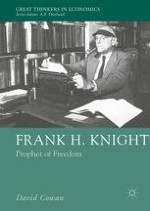2016 | Buch
Über dieses Buch
This book argues for the reconsideration of Frank Knight and the Chicago School of Economic thought in a post-Financial Crisis world. The author posits that the discussion of the founder of "Knightian Uncertainty" can reveal new insights into what the economy can do for society, as his prophetic insights can offer a view into the soul of the modern economy. The book first considers Frank Knight's early history and the unfolding of his economic philosophy before going on to evaluate his enduring legacy. All those interested in the influence of political and religious philosophy on economics will be delighted to discover the lasting impact of this great economic thinker.
Anzeige
